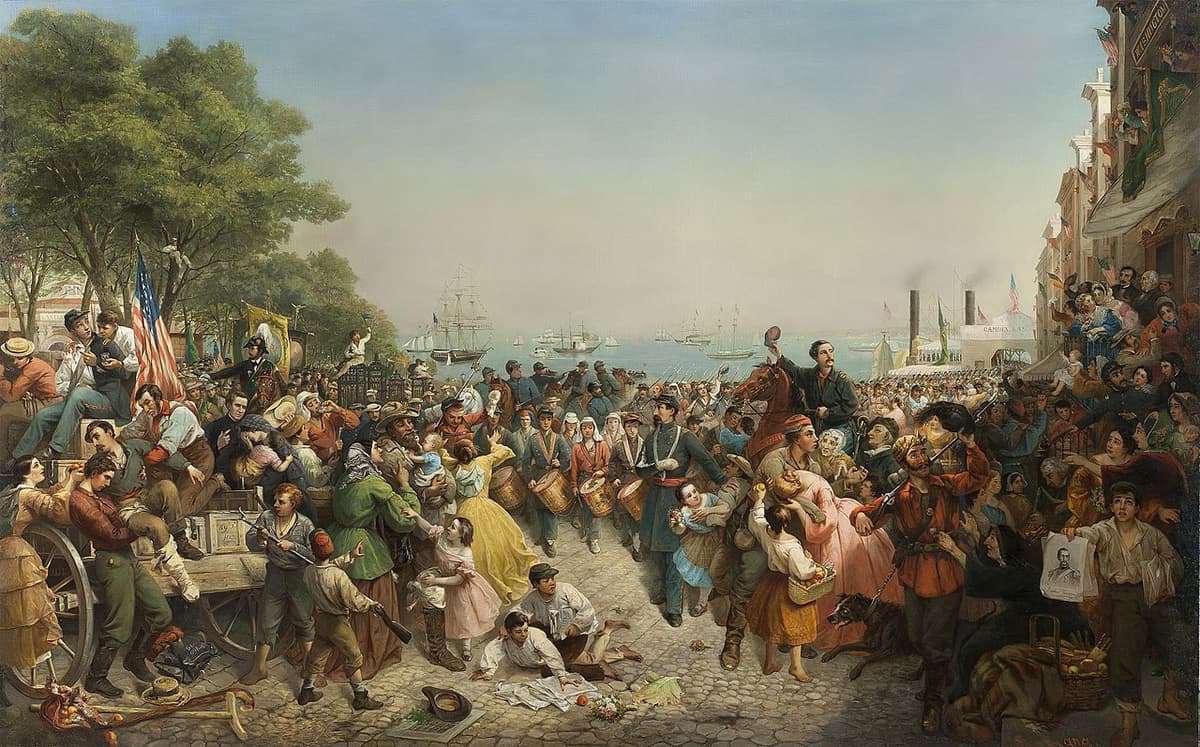A Toast to the Irish Regiment, New York’s ‘Fighting 69th,’ on St. Patrick’s Day
The Irish Regiment has been ‘a beacon of truth, justice, and the defense of the United States.’

Americans celebrating Irish heritage on St. Patrick’s Day can do so by toasting the legendary 69th Infantry Regiment. “The Fighting Irish” embody the spirit behind today’s parades and parties, with laurels from two dozen campaigns, including combat roles dating back to the Civil War.
The Irish Regiment, the master blender of Fighting 69th Irish Whiskey, tells The New York Sun, “has been a beacon of truth, justice, and the defense of the United States since its founding.” The whiskey is his way to “remember that the Irish are … not just a stereotype.”
Fighting 69th Irish Whiskey is, Chris Leskowicz said, “produced in conjunction with the 69th Infantry Regiment Historical Trust.” A portion of sales supports that non-profit’s mission “as well as philanthropic activities on behalf of the regiment’s veterans and their families.”
When the Irish Brigade leads the 174th St. Patrick’s Day Parade at New York City on Monday, it will be carrying on a ceremonial role that began as a practical one. Organizers in 1851, Mr. Leskowicz said, feared that “ironworkers would attack the Irish” who they “considered scum.”
The 69th’s history, Mr. Leskowicz said, “dates back to 1849 when it was created as part of the New York State Militia.” It has since “seen combat in five wars,” including both World Wars, Iraq, and Afghanistan. “Members of the Regiment recently returned from a deployment to the Horn of Africa.”
After the Confederates won at the First Battle of Bull Run in July 1861, Americans found hope in the Irish Regiment’s performance. “Above our shame and sorrow,” The New York Sun’s editor, Benjamin Day, wrote, their “wonderful courage and endurance … shines like a halo of glory.”
Many Union troops had fled that first clash with the Confederates, which occurred within sight of Washington D.C. But the 69th didn’t abandon their breastworks or retreat. They responded to the rebel yells with a battle cry of their own in Gaelic: “Faugh a Ballagh” or “Clear the Way.”
The Fighting Irish were an example for all Americans to emulate, Day wrote. “The 69th Irish led the advance,” he said, “and a valor and persistence superior to theirs is not on record in history, ancient or modern.”
Day wrote that “the glorious 69th” was “stark and cold without tears of sorrow and pride” and that their fallen were “worthy of the cause they went to defend.” The editorial struck a chord with Northerners reeling from defeat at Bull Run, having expected to put down the rebels with ease.
An Irish “cartman,” or deliveryman, submitted a poem in response to Day’s editorial “about his now immortalized countrymen of the 69th Irish Regiment.” The Sun published the verses on July 26, 1861. “Glorious, gallant 69th,” it read, “in loyal hearts, their deeds will shine forever.”
The poem saluted the dead as “martyred sons of freedom” who, “with flashing eyes and bayonet points,” cried out for “our union,” until their lives “were spent.” Many Irish soldiers would make the ultimate sacrifice to preserve the Union.
At Fredericksburg in December 1862, Mr. Leskowicz said, the 69th suffered “almost an 85% casualty rate.” A regiment of Confederate Irishmen from Georgia exacted the greatest toll. Many had fled the draft and the riots against it in New York City that the 69th was instrumental in quelling.
The Confederate commander, General Robert E. Lee, coined “the Fighting 69th” nickname at Gettysburg. Taking the fight to the enemy would later personify the Union commander, President Grant, who beat Lee. Grant’s mother, Hannah Simpson, also hailed from the Emerald Isle.
The whiskey bearing the 69th’s name is the brainchild of a former officer in the 69th, Colonel James Tierney. From World War I’s Rainbow Division to Okinawa in World War II and Notre Dame’s Fighting Irish, it’s the latest way the 69th’s legacy is being poured into the American melting pot.
This St. Patrick’s Day, we are the “children’s children” who that Civil War poem predicted would “bless” the “glorious, gallant” 69th “forever.” The Irish Regiment has always had the courage to stand against the darkness — and, because of sacrifices like theirs, Americans are free to parade and party in light.

